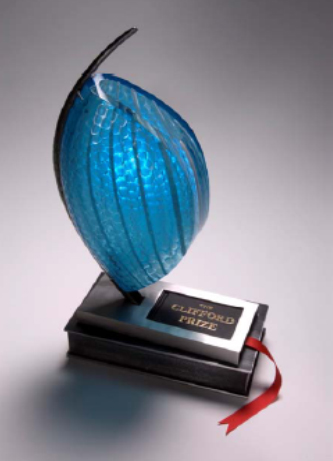CLIFFORD PRIZE
The Clifford Prize recognizes international excellence in Cancer Research.

The Prize represents an appreciation by Australian Scientists of the outstanding scientific discoveries that have laid the foundation of new and significant cancer therapies. The Prize consists of a Perpetual Trophy and a glass sculpture (both manufactured by Nick Mount). The awardee also receives a magnum of Clarendon Hills ‘Astralis’.
The presentation of the Prize will always be linked to the biennial Barossa signalling meetings. This conjunction recognizes the importance of high-powered small meetings as one of the major drivers of new ideas, gives the possibility for more junior scientists to interact closely with the recipients of the Prize, and emphasizes Australia, and in particular South Australia, as a leader in scientific as well as gastronomic and epicurean innovation.
The Prize was initiated by the organizers and their home Division of Human Immunology, in the Hanson Centre for Cancer Research, now a major component of the Centre for Cancer Biology, and is named after Bob Clifford, a previous Chairman of the Council of the Institute of Medical and Veterinary Science (now SA Pathology).
Previous recipients of the Clifford Prize for Cancer Research include:
2005: Axel Ullrich of the Max Planck Institute of Biochemistry, Germany, for his discovery of the HER2/neu oncogene, the basis of the therapeutic Herceptin for the treatment of breast cancer.
2007: Tony Hunter of the Salk Institute, La Jolla, USA, for his discoveries that proteins can undergo phosphorylation on tyrosine, and of tyrosine kinases.
2009: John Dick of University of Toronto, Ontario, Canada, for his work on cancer stem cells, their biology and their potential as therapeutic targets.
2011: Vishva Dixit of Genentech, South San Francisco, USA, for his work on the cell death pathway and pro-inflammatory signalling in cancer.
2013: Arul Chinnaiyan of University of Michigan Medical School, Ann Arbor, USA, for his work on the pathogenesis of breast and prostate cancer, and cancer bioinformatics.
2015: Joint winners Inder Verma of the Salk Institute for Biological Studies, La Jolla, USA and Jane Visvader of the Walter and Eliza Hall Institute, Melbourne, for their work in targeted cell therapies for cancer.
2017: Joseph Schlessinger of Yale University, New Haven, USA, for his work on the receptor tyrosine kinase (RTK).
2019: Karen Vousden of the Francis Crick Institute, London, UK, for her work on the molecular basis of cancer, with emphasis on the p53 tumour suppressor gene.
Nominations for the award should include the candidate’s full CV, and a brief description of the candidate’s contributions to cancer research, highlighting the impact of the work on cancer treatment.
Nominations should be submitted by email to: joanne.pappas@sa.gov.au
Note that it is a requirement that the recipient of the award attends the Barossa Meeting to receive the award and to present a talk describing the work that has led to the award.
Nominees will be judged by an independent panel of Australian Scientists together with previous winners.
